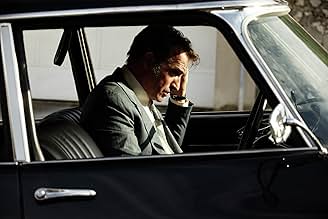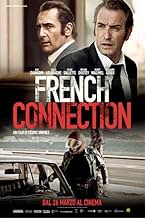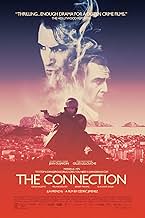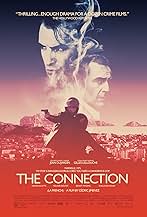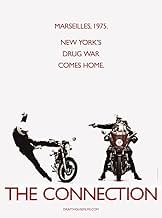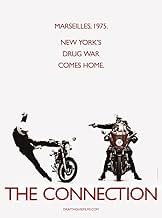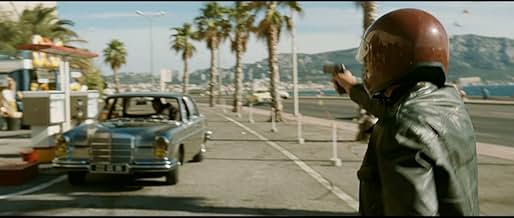PUNTUACIÓN EN IMDb
7,1/10
13 mil
TU PUNTUACIÓN
Un magistrado de la policía francesa lleva años intentando acabar con una de las redes de narcotráfico más poderosas del país.Un magistrado de la policía francesa lleva años intentando acabar con una de las redes de narcotráfico más poderosas del país.Un magistrado de la policía francesa lleva años intentando acabar con una de las redes de narcotráfico más poderosas del país.
- Dirección
- Guión
- Reparto principal
- Premios
- 2 premios y 5 nominaciones en total
Reseñas destacadas
Pierre (Jean Dujardin) is a good French cop we can admire; Tany (Gilles Lellouche) is a drug lord we can like despite his murderous heroin. The Connection, loosely based on incidents surrounding the infamous French Connection, both real and depicted in William Friedkin's 1971 award-winning thriller starring Gene Hackman. If you can separate yourself from the testosterone-fueled business, you will experience a thriller of humane proportions.
Pierre has taken over the magistrate's responsibility for mob activity, and heroin is the big enemy. Writer-director Cedric Jimenez and writer Audrey Diwan expertly navigate between his daily professional activity and after-work family life with a wife and two children. When it's revealed that Pierre had an addictive gambling problem, the audience is appreciative of his weakness but cognizant of his obsessive personality, such as pursuing Tany.
The film also shows mobster Tany in his two worlds of business and family. While the director may too frequently parallel edit the two characters in these roles, he successfully reveals two characters with traits we can understand.
Beyond the inevitable blood, of which there is less than might be expected, is the oft-told tale of highly-driven men who want successful careers and happy family life—those of us who have seen many such thrillers know the balance is impossible. In a way the film draws us into each sphere with responses more sympathetic than judgmental.
The pace of The Connection is frenetic between paralleling the two principles' activities and chronicling the confrontations (I like when the two meet at a remote spot in a low-key, un-macho response for both) many of which are hair-raising heists and busts. Just as often, however, the film slows it down to a daily level that draws in our attention to the little things of life yet keeps the suspense and terror in the background.
As in A Most Violent Year, starring Oscar Isaac about a good but going-bad business man in NYC in the early '80's, so too does The Connection make that lawless time, albeit European, seductive because Dujardin is so compelling while he breaks laws to stop crime. It's ironic and complicated. That's life, and that's Chinatown, Jake.
Pierre has taken over the magistrate's responsibility for mob activity, and heroin is the big enemy. Writer-director Cedric Jimenez and writer Audrey Diwan expertly navigate between his daily professional activity and after-work family life with a wife and two children. When it's revealed that Pierre had an addictive gambling problem, the audience is appreciative of his weakness but cognizant of his obsessive personality, such as pursuing Tany.
The film also shows mobster Tany in his two worlds of business and family. While the director may too frequently parallel edit the two characters in these roles, he successfully reveals two characters with traits we can understand.
Beyond the inevitable blood, of which there is less than might be expected, is the oft-told tale of highly-driven men who want successful careers and happy family life—those of us who have seen many such thrillers know the balance is impossible. In a way the film draws us into each sphere with responses more sympathetic than judgmental.
The pace of The Connection is frenetic between paralleling the two principles' activities and chronicling the confrontations (I like when the two meet at a remote spot in a low-key, un-macho response for both) many of which are hair-raising heists and busts. Just as often, however, the film slows it down to a daily level that draws in our attention to the little things of life yet keeps the suspense and terror in the background.
As in A Most Violent Year, starring Oscar Isaac about a good but going-bad business man in NYC in the early '80's, so too does The Connection make that lawless time, albeit European, seductive because Dujardin is so compelling while he breaks laws to stop crime. It's ironic and complicated. That's life, and that's Chinatown, Jake.
The must use adjectives are thrilling and mind blowing. Seriously, the motion picture directed and written by Cédric Jimenez was emotionally heavy. The movie was inspired by true events set in the 1970s. It was about a Neapolitan Mafia Boss Tanny Zampa who ran a French extortion gang in Marseille, France. The Kingpin and his mob later exploded into 'The Connection'. It meant heroin purchased from Turkey being flood into New York by the French Mafia. What stood in their way was dedicated detective Pierre Michel who raged bloody war against their money laundering Empire.
In addition, this action packed Noir was set in Marseille, France. I loved how the opening scene exposed a landscape filled with historical buildings, palm trees, straight roads and the sea that reflected blue from the sky. The vibrating and aggressive sound from the motorbike gave the picture a dramatic sound. Expressive music which featured a woman singing her heart out gave a lovely mood. The song was Jerome sang by Lykke Li. Bang! Bang! Bullets flashed at a car driver on the streets. Hit men on motorbike were like characters from a western movie shooting down their victim. The act created a contrast from beautiful to horrendous.
What is more, the tense violence gave the film justice. It empathised the horrors of the French Mafia who imported tons of heroin from Turkey to France and New York City. The pace was very fast. It demonstrated how society was corrupt by dangerous mobsters who rhymed with monsters. The viciousness contained scenes of Zampa and his henchmen killing those who did not pay up protection rackets. The shootings would be extremely loud and bloody. Graphic tortures was like a rakish rhythm in the content. It showed how evil bloodbaths were. There are media reports of President Nixon declaring war against drugs. This showed what impact on drug affairs did on lives.
Moreover, Tanny Zampa was like a black and white painting. He loved his family and destroyed his enemies. He owned a fabulous club in Marseille. The dedicated detective Pierre Michel was hungry to bring an end to 'The Connection'. Pierre went to the extent in taking the law into his own hands to expose his patriotic nature. The two main contrasting characters had their glorious rise and tragic downfalls.
To add, a scene which I also liked the most was when Tanny and his thugs interrogated their extortion victim. The sufferer was strapped to a chair. He wore his fabulous tuxedo. The room had silver walls. The scene played classic disco music which empathised disturbing psychology on mobsters killing legit people who did not pay up protection rackets. A gunned down casino owner. Left to bleed in a car park in broad day light. Tanny and his boys walked off like it just was business nothing personal.
To carry on, the visualisation had some glimpse shots, fast forwarding and an expression in chiaroscuro. The film looked like a production from the 1970s. This helped empathise the time period. Laurent Tangy as the cinematographer expressed the contrast between light and shade. It resulted to the picture having a dark and light atmosphere. From urban to a reveal location, the lighting exposed the two different worlds. In Tanny's nightclub the cinematographer strengthen the shade and exaggerated the lighting. The high saturation was the icing on the cake. The camera shots in the French picture had long distance shots, up right footages and birds eye view. This implied the importance of society.
As a continuation, soundtrack included an orchestra, disco music and electronic. The sound effects in the film created a tense tone. It backed up how 'The Connection' had a negative effect on Marseille and New York. The emotionally heavy orchestra which was played in the end implied the tragic downfalls of the two opposing characters. Detective Pierre was shot and left to death in his neighbourhood. Crime Boss Tanny was finally arrested as his Empire crumbled.
For the story itself, all I can say is that it was about time to have a cinematic film about the rise and the downfall of the French heroin connection based in the 1970s. Watching the same old Sopranos could not compete with this breed of Gangsterism due to the fact that 'The Connection' focused on the sociological theme. The content was unique, because I was getting bored watching the same old Italian wise guys like 'Goodfellas', 'Mean Streets' and 'The Sopranos.' Those three titles do not go into political depth. Cinema needs more genres which are so different.
All in all, I give this film a solid .. 8/10.
In addition, this action packed Noir was set in Marseille, France. I loved how the opening scene exposed a landscape filled with historical buildings, palm trees, straight roads and the sea that reflected blue from the sky. The vibrating and aggressive sound from the motorbike gave the picture a dramatic sound. Expressive music which featured a woman singing her heart out gave a lovely mood. The song was Jerome sang by Lykke Li. Bang! Bang! Bullets flashed at a car driver on the streets. Hit men on motorbike were like characters from a western movie shooting down their victim. The act created a contrast from beautiful to horrendous.
What is more, the tense violence gave the film justice. It empathised the horrors of the French Mafia who imported tons of heroin from Turkey to France and New York City. The pace was very fast. It demonstrated how society was corrupt by dangerous mobsters who rhymed with monsters. The viciousness contained scenes of Zampa and his henchmen killing those who did not pay up protection rackets. The shootings would be extremely loud and bloody. Graphic tortures was like a rakish rhythm in the content. It showed how evil bloodbaths were. There are media reports of President Nixon declaring war against drugs. This showed what impact on drug affairs did on lives.
Moreover, Tanny Zampa was like a black and white painting. He loved his family and destroyed his enemies. He owned a fabulous club in Marseille. The dedicated detective Pierre Michel was hungry to bring an end to 'The Connection'. Pierre went to the extent in taking the law into his own hands to expose his patriotic nature. The two main contrasting characters had their glorious rise and tragic downfalls.
To add, a scene which I also liked the most was when Tanny and his thugs interrogated their extortion victim. The sufferer was strapped to a chair. He wore his fabulous tuxedo. The room had silver walls. The scene played classic disco music which empathised disturbing psychology on mobsters killing legit people who did not pay up protection rackets. A gunned down casino owner. Left to bleed in a car park in broad day light. Tanny and his boys walked off like it just was business nothing personal.
To carry on, the visualisation had some glimpse shots, fast forwarding and an expression in chiaroscuro. The film looked like a production from the 1970s. This helped empathise the time period. Laurent Tangy as the cinematographer expressed the contrast between light and shade. It resulted to the picture having a dark and light atmosphere. From urban to a reveal location, the lighting exposed the two different worlds. In Tanny's nightclub the cinematographer strengthen the shade and exaggerated the lighting. The high saturation was the icing on the cake. The camera shots in the French picture had long distance shots, up right footages and birds eye view. This implied the importance of society.
As a continuation, soundtrack included an orchestra, disco music and electronic. The sound effects in the film created a tense tone. It backed up how 'The Connection' had a negative effect on Marseille and New York. The emotionally heavy orchestra which was played in the end implied the tragic downfalls of the two opposing characters. Detective Pierre was shot and left to death in his neighbourhood. Crime Boss Tanny was finally arrested as his Empire crumbled.
For the story itself, all I can say is that it was about time to have a cinematic film about the rise and the downfall of the French heroin connection based in the 1970s. Watching the same old Sopranos could not compete with this breed of Gangsterism due to the fact that 'The Connection' focused on the sociological theme. The content was unique, because I was getting bored watching the same old Italian wise guys like 'Goodfellas', 'Mean Streets' and 'The Sopranos.' Those three titles do not go into political depth. Cinema needs more genres which are so different.
All in all, I give this film a solid .. 8/10.
"The Connection" (2014 release from France and Belgium; 135 min. original title "La French") is an action crime drama, "loosely based on real events" we are reminded at the beginning of the movie. Those real events are the role the southern French city of Marseille played in supplying (some might say: overwhelming) the US with hard drugs in the 1970s. As the movie opens, it says "Marseille, 1975", and as we follow a motor scooter, the biker all of the sudden stops, and shoots someone in cold blood in a nearby car. We then get to know Pierre Michel, a magistrate who is just being transferred from Juvenile to Organized Crime. Michel throws himself with gusto into the mob-fighting, and along the way bruises with his colleagues at work too. At this point we're about 15 min. into the movie, but to tell you more would spoil your viewing experience, you'll just have to see for yourself how it all plays out.
Couple of comments: first, when a movie puts up a disclaimer that says "loosely based" on real events, you can bet your last dollar that the movie departs significantly from what really happened. How is it that "The French Connection", surrounding similar facts from the US perspective, was made in 1971, yet this movie plays out from 1975 into the early 80s? If you set aside historical concerns, this movie does quite well, actually. The story is solid and takes its time to play out. No, there isn't a singular scene as memorable as the car/elevated train chase as in "The French Connection", but there is enough tension in "The Connection" that it kept me interested from start to finish. Second, a major plus is the historical accuracy in the decors and scenery. Right away from the opening scene on the motor scooter, I was marveling at all the 1970s French cars (Renault, Simca, Citroen, you name, they're all there, and plentiful), which I loved growing up in Belgium during that era. Likewise with attention to clothing and such. Third, the movie is technically a French-Belgian co-production, and the Belgian investors required some scenes shot in Belgium. The Krypton night club scenes were shot in Antwerp, Belgium (my original home town), and the prison scenes were shot in Charleroi, Belgium. Fourth, Jean Dujardin has a meaty character and role here, and he gives a fine performance as Magistrate Michel. Last but certainly not least, there is a very nice collection of songs in the movie from that era, both French (Serge Gainsbourg, Mike Brant, Sheila, etc.) and English (Blondie, Velvet Underground, Venus Ganga, Kim Wilde, etc.). It's available on Amazon France.
"The Connection" opened last weekend at my local art house theater here in Cincinnati, and I finally had a chance to see it. The early evening screening where I saw this at was attended so-so, and that's a shame. I found "The Connection" always entertaining, never boring and at times outright riveting. If you are in the mood for a quality foreign movie, or perhaps just curious how "la French" (as the term 'French Connection' was referred to in France) is portrayed by this French interpretation of it, you cannot go wrong with this movie. "The Connection" is HIGHLY RECOMMENDED!
Couple of comments: first, when a movie puts up a disclaimer that says "loosely based" on real events, you can bet your last dollar that the movie departs significantly from what really happened. How is it that "The French Connection", surrounding similar facts from the US perspective, was made in 1971, yet this movie plays out from 1975 into the early 80s? If you set aside historical concerns, this movie does quite well, actually. The story is solid and takes its time to play out. No, there isn't a singular scene as memorable as the car/elevated train chase as in "The French Connection", but there is enough tension in "The Connection" that it kept me interested from start to finish. Second, a major plus is the historical accuracy in the decors and scenery. Right away from the opening scene on the motor scooter, I was marveling at all the 1970s French cars (Renault, Simca, Citroen, you name, they're all there, and plentiful), which I loved growing up in Belgium during that era. Likewise with attention to clothing and such. Third, the movie is technically a French-Belgian co-production, and the Belgian investors required some scenes shot in Belgium. The Krypton night club scenes were shot in Antwerp, Belgium (my original home town), and the prison scenes were shot in Charleroi, Belgium. Fourth, Jean Dujardin has a meaty character and role here, and he gives a fine performance as Magistrate Michel. Last but certainly not least, there is a very nice collection of songs in the movie from that era, both French (Serge Gainsbourg, Mike Brant, Sheila, etc.) and English (Blondie, Velvet Underground, Venus Ganga, Kim Wilde, etc.). It's available on Amazon France.
"The Connection" opened last weekend at my local art house theater here in Cincinnati, and I finally had a chance to see it. The early evening screening where I saw this at was attended so-so, and that's a shame. I found "The Connection" always entertaining, never boring and at times outright riveting. If you are in the mood for a quality foreign movie, or perhaps just curious how "la French" (as the term 'French Connection' was referred to in France) is portrayed by this French interpretation of it, you cannot go wrong with this movie. "The Connection" is HIGHLY RECOMMENDED!
If I could only recommend you go and see one film this year, The Connection would be it.
The film follows the true story of the rise and fall of Pierre Michel "The Judge", played by The Artist's Oscar winning Jean Dujardin, against the Marseillaise mafia gang The French Connection in the 1970s. The story had already been put to cinema in The Judge (1984), but this time the story's been redone much more ambitiously.
It's a typical good guy versus bad guy story, but it's the bells and whistles in this film that really make it so much more than that. The director achieves the perfect combination of action, drama, comedy and tragedy with the irrepressible Mediterranean sun beating down on every day time scene in the film. The Mediterranean settings give the film a sense of glamour and surrealism, juxtaposing the surreal nature of life as a successful drug trafficker in the 1970s, passing time between seaside villas and the biggest nightclub in Marseille.
This is film making at its best - it's as if the screen writer and director Cédric Jimenez pulled out an old school book of film making craft written in the 1970s and followed all the old rules to perfection to bring about not only a brilliant piece of cinematic entertainment, but also of art. This film is a living, breathing and intimate nostalgic reinvention of the 1970s and a just and accurate portrayal of a real gangster story, with some liberties in representing the character's private lives.
Cédric Jimenez grew up himself in Marseille in the 1970s and says that the story of the Judge has run through his veins his whole life. He has wanted to make this film as long as he has wanted to be a film maker, starting his career initially as a documentary maker. He chose to shoot the whole film with a hand held camera, which gives the film it's intimate and raw feeling.
It is an absolute viewing pleasure to be immersed back into the 1970s era and the sets and costumes have been rendered to perfection, to every last detail. The velour furniture, the dingy nightclubs, the glamorous dresses and old style police surveillance technologies are a delight to rediscover. The cowboy style of policing in the 1970s makes the action scenes much more exciting than anything depicting the risk-averse 2000s - the only person in the film wearing even a bullet proof vest is the gang leader Gaëtan "Tany" Zamper (Gilles Lellouche).
There are countless unforgettable scenes in this film, the dialogue is witty, the action is edgy and the acting is superb. Another highlight is the film's soundtrack featuring endless classics from the 1970s (Blondie, Kim Wilde and the Velvet Underground) and tunes by composer Guillaume Roussel that reflect the film soundtracks of the time (for example, his tune Meurtre de fou). It can be tough to watch a sub-titled film for 2h15min, but believe me it's worth it.
The film follows the true story of the rise and fall of Pierre Michel "The Judge", played by The Artist's Oscar winning Jean Dujardin, against the Marseillaise mafia gang The French Connection in the 1970s. The story had already been put to cinema in The Judge (1984), but this time the story's been redone much more ambitiously.
It's a typical good guy versus bad guy story, but it's the bells and whistles in this film that really make it so much more than that. The director achieves the perfect combination of action, drama, comedy and tragedy with the irrepressible Mediterranean sun beating down on every day time scene in the film. The Mediterranean settings give the film a sense of glamour and surrealism, juxtaposing the surreal nature of life as a successful drug trafficker in the 1970s, passing time between seaside villas and the biggest nightclub in Marseille.
This is film making at its best - it's as if the screen writer and director Cédric Jimenez pulled out an old school book of film making craft written in the 1970s and followed all the old rules to perfection to bring about not only a brilliant piece of cinematic entertainment, but also of art. This film is a living, breathing and intimate nostalgic reinvention of the 1970s and a just and accurate portrayal of a real gangster story, with some liberties in representing the character's private lives.
Cédric Jimenez grew up himself in Marseille in the 1970s and says that the story of the Judge has run through his veins his whole life. He has wanted to make this film as long as he has wanted to be a film maker, starting his career initially as a documentary maker. He chose to shoot the whole film with a hand held camera, which gives the film it's intimate and raw feeling.
It is an absolute viewing pleasure to be immersed back into the 1970s era and the sets and costumes have been rendered to perfection, to every last detail. The velour furniture, the dingy nightclubs, the glamorous dresses and old style police surveillance technologies are a delight to rediscover. The cowboy style of policing in the 1970s makes the action scenes much more exciting than anything depicting the risk-averse 2000s - the only person in the film wearing even a bullet proof vest is the gang leader Gaëtan "Tany" Zamper (Gilles Lellouche).
There are countless unforgettable scenes in this film, the dialogue is witty, the action is edgy and the acting is superb. Another highlight is the film's soundtrack featuring endless classics from the 1970s (Blondie, Kim Wilde and the Velvet Underground) and tunes by composer Guillaume Roussel that reflect the film soundtracks of the time (for example, his tune Meurtre de fou). It can be tough to watch a sub-titled film for 2h15min, but believe me it's worth it.
In the late 1960s and early 1970s drugs were flowing from Marseille to New York in a sophisticated and sustained operation. The Americans made two movies about the racket: "The French Connection" (1971) set in New York and "The French Connection II" (1975) located in Marseiiles, in both cases with Gene Hackman famously playing the police crime-buster. French cinema too has had two cracks at telling the story: first with "The Judge" (1984) and then with "The Connection" ("La French" in French) in 2014.
In the French films, the hero is not a policeman but a magistrate, in "The Connection" played by played by Jean Dujardin, best known outside France for his performance in the silent film "The Artist". The role of the chief criminal is taken by Gilles Lelouche. There is a short scene where the two meet alone which is reminiscent of the cafe scene between Al Pacino and Robert de Niro in "Heat". "The Connection" is not one of the the classics like "The French Connection" and "Heat" but it is a stylish, if clichéd, thriller with hand-held camera-work and atmospheric soundtrack adding to the impact.
In the French films, the hero is not a policeman but a magistrate, in "The Connection" played by played by Jean Dujardin, best known outside France for his performance in the silent film "The Artist". The role of the chief criminal is taken by Gilles Lelouche. There is a short scene where the two meet alone which is reminiscent of the cafe scene between Al Pacino and Robert de Niro in "Heat". "The Connection" is not one of the the classics like "The French Connection" and "Heat" but it is a stylish, if clichéd, thriller with hand-held camera-work and atmospheric soundtrack adding to the impact.
¿Sabías que...?
- CuriosidadesThe Gaumont animated opening logo is the 70's one.
- PifiasAn early title card indicates the film taking place beginning in 1975. A shot of a truck being unloaded on a New York dock shows the World Trade Center Twin Towers under construction. The Twin Towers were opened in 1973, with construction completed prior to that.
- ConexionesReferenced in Cowboy (2017)
Selecciones populares
Inicia sesión para calificar y añadir a tu lista para recibir recomendaciones personalizadas
- How long is The Connection?Con tecnología de Alexa
Detalles
- Fecha de lanzamiento
- Países de origen
- Sitio oficial
- Idiomas
- Títulos en diferentes países
- Connexió Marsella
- Localizaciones del rodaje
- La Ciotat, Bouches-du-Rhône, Francia(seaside road)
- Empresas productoras
- Ver más compañías en los créditos en IMDbPro
Taquilla
- Presupuesto
- 26.000.000 US$ (estimación)
- Recaudación en Estados Unidos y Canadá
- 190.980 US$
- Fin de semana de estreno en EE. UU. y Canadá
- 10.335 US$
- 17 may 2015
- Recaudación en todo el mundo
- 12.062.441 US$
- Duración2 horas 15 minutos
- Color
- Mezcla de sonido
- Relación de aspecto
- 2.35 : 1
Contribuir a esta página
Sugerir un cambio o añadir el contenido que falta

Principal laguna de datos
By what name was Conexión Marsella (2014) officially released in India in English?
Responde






